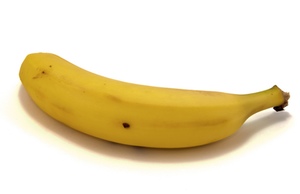
During your next lengthy workout, put down the Gatorade and do what the monkeys do: Eat a banana.
It may not sound as refreshing as a cold sports energy drink, but new research shows bananas provide the same amount of energy as sports drinks, as well as more blood antioxidant capacity and higher dopamine levels—plus they’re cheaper and all natural.
The study, published last week in PLos One, compared 14 experienced male cyclists’ performances while ingesting either bananas or carbohydrate drinks every 15 minutes. The cyclists performed two time trials, riding a 75-kilometer course described as mountainous and moderately difficult. Blood tests were taken before and after each ride.
The researchers noted that the cyclists avoided using high-dose vitamin and mineral supplements, herbs, and medications “known to affect inflammation and immune function” throughout the study. They were also required to maintain a diet moderate in carbohydrates three days before each time trial.
Researchers found that the cyclists’ heart rates, exertion, and time did not differ between the banana and energy drink trials. There was also no significant difference between exercise-induced inflammation, oxidative stress, and changes in innate immune function. Similar results occurred in a separate study involving 10-kilometer treadmill runs and runners who consumed bananas and various drinks.
However, cyclists reported feeling much more full and bloated during the banana trial—they did eat six to seven bananas total, after all. They also lost 0.4 kilograms more body weight during the banana trial than when drinking the carbohydrate drink, which was Gatorade.
What’s notable about this study is that even though bananas and sports energy drinks have varying nutrient levels, they still provide similar performance benefits. The drink used contained 26.2 grams total sugar, with 11 grams of glucose, 9.1 grams of fructose, and 4.6 grams of sucrose. Bananas contain 27 grams of carbohydrates, 6.4 grams of starch, and almost half the amount of glucose, fructose, and sucrose found in the Gatorade.
Researchers note that overall, eating a banana before and during a long exercise session is “an effective strategy, both in terms of fuel substrate utilization and cost, for supporting performance.”
The full study is available at PLos One’s website.

















